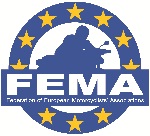The Federation of European Motorcyclists Associations (FEMA) is the only Brussels-based riders’ organisation working to ensure that the interests of Europe’s road-riding motorcyclists are protected and advanced. MAG Ireland is a national delegate member of FEMA and sees the European co-operation of like-minded motorcyclists groups as the most effective and efficient way to represent the interests of Irish motorcyclists at a European level.
FEMA’s Web Page can be found at http://www.fema-online.eu/
Background
FEMA is the result of a merger on Jan 1st 1998 between the Federation of European Motorcyclists (FEM) and the European Motorcyclists Association (EMA). FEM was formed in 1988 and at the end of 1997 had 19 national riders’ rights organisations and 45 national motorcycle clubs from 16 European countries in membership. EMA was formed in the early 90s and consisted mostly of organisations from Scandinavian countries which were later joined by British, German and Italian groups. MAG Ireland joined FEM in 1989 and is a founder member of FEMA.
Why is FEMA necessary?
The European Union is required by various treaties to establish European standards or norms. Motorcyclists are affected by this process in many ways. The machines they buy and ride, the roads they ride on, the clothing they wear, the licences they hold, the work they do or have done on their machines, the replacement parts they need, all have received or are receiving the attention of the European Union’s lawmakers.
This process of harmonisation has resulted in many restrictive proposals coming from the European Union. Motorcyclists are often seen as an easy target and their lifestyles perceived as anti-social and dangerous by European bureaucrats. By being where the strategies are developed and the decisions are made we are able to challenge them. This requires constant vigilance to identify measures likely to affect the rights of motorcyclists and, having done so, hard work on an almost continuous basis while they progress through the lawmaking process.
How does FEMA work?
Our policies and strategies are determined by the FEMA Committee of representatives from each of the affiliated national riders’ rights organisations and are acted upon by the national riders’ rights organisations and the Secretariat. The Secretariat maintains formal and informal contacts with officials of relevant Directorate General departments of the European Commission, Members of the European Parliament, Member States’ Permanent Representatives and with appropriate interest groups such as motorcycle manufacturers and road-safety organisations.
These contacts enable FEMA to be aware of developments at the earliest possible opportunity and to follow proposals through all the stages of the legislative procedure. The Secretariat liaises and consults with member organisations and on agreed issues, co-ordinates lobby campaigns on national and European lawmakers to support the motorcyclists’ position on European matters. Most of the money required to operate FEMA comes from motorcyclists. Affiliated national riders’ rights organisations and motorcycle clubs pay an annual fee which is proportional to the size of the organisation.
What has FEMA achieved ?
In the short-time since its establishment, the efforts of the European motorcyclist movement have brought about many improvements to proposed European legislation. European proposals for leg protectors were stopped, as was the 100 bhp Power Limit Directive. The Type Approval Framework Directive was altered to exclude one-off specials and custom bikes. Exemptions for replacement parts, such as exhaust systems, for vintage and classic machines, have been achieved and the proposals to have a three-stage motorcycle licence in the Driving Licence Directive was stopped.
What FEMA does;
- Works extensively in the European Parliament representing motorcyclists, maintaining a regular presence.
- Develops relationships with politicians, encouraging them to try biking, explaining issues, gaining support.
- Establishes friendly contacts in the European Commission (Euro civil servants) departments for: industry, transport, environment, small businesses, internal market, competition, consumers
- Co-ordinates the national riders lobby of letter-writing & visits to the European Parliament, Commission & national governments.
- Holds well-attended “Euro Demo” protest rides, pro-motorcycle public relations exercises, and practical demos
- Develops the relationship with the European motorcycle manufacturers’ association ACEM, and with individual manufacturers
- Establishes coalitions and joint campaigns with organisations who are not motorcycle users
- FEMA also works with FIM in representing riders on road safety and construction standards issues.
What does the future hold?
There will be European motorcycling legislation for many years to come.
Issues such as power limits and anti-tamper measures will reappear. Further reductions to the noise and emission limits are almost certain. Some national governments favour wider anti-tampering measures. European road worthiness testing laws are set to be extended to motorcycles from 2022. Motorcycle road bans and limiting the use of vintage and classic machines are also likely to be considered.
Many other areas, such as the harmonisation of motor vehicle insurance costs, are also likely to be a threat to riders in the future. Without any doubt there will be the need to have an effective organisation representing our interests within the institution of the European Union (and possibly also the United Nations) for the foreseeable future.
